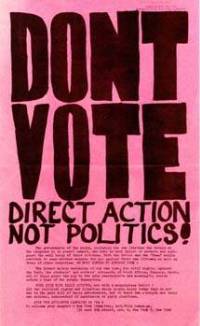Dirty words: “electoral politics”

Where, exactly, is the line between social movements and electoral politics? Aside from being a heady topic of academic inquiry, this is an important, practical question for activists eager to be both effective and progressive in deciding where to put their time, hopes and energies. I have a lot of friends and colleagues who seem to approach anything on a ballot with suspicion and no small bit of righteous indignation. Social movement activism is de rigueur, while working for a candidate is seen as either a diversion or a sell-out. Protest bad politicians, certainly, but, argue many, don’t lift a figure to replace them with better ones. They won’t be perfect, so chuck the whole operation and stay above the fray.
If my tone here seems annoyed, it may have something to do with the fact that I spend many hours of my time working in the electoral arena, and often find good candidates and good causes woefully understaffed. But this Hadrian’s Wall between electoral and “movement” politics is also offensive to me on an intellectual level. Social movements have myriad goals, and there are certainly many for which electoral activity simply makes no sense. Cultural movements, artistic movements, religious movements may well have a focus which makes the state as a target illogical. However, for those movements which seek to rearrange material power, putting candidates into office and working to keep them accountable is bread and butter. Imagine a Civil Rights movement which decided that the vote was not important.
Good progressive electoral politics flows from social movement activism. Good social movement activism doesn’t stop at the halls of governance or ignore the ballot box. It’s that simple, folks.
Have movements overemphasized electoral politics at the expense of organizing? Absolutely. Have movement organizations fallen down on the job of building power and support and leadership at the grassroots level? Yes. Oligarchy? Corruption? Co-Optation? Yes, yes, yes. But there are plenty of movements which stayed out of politics in order to stay “pure”, and they have also died myriad deaths. Obsolescence being one of them.
The historical touchstone for many of the anti-electoral-politics crowd is the Zapatista revolution. This “non-Enlightenment” movement, which supposedly eschews engagement with the state and “formal” politics has inspired a generation of postmodern rhetoric-driven junior theorists. I don’t want to dwell on a critique of Zapatismo here, but I do believe that their effect on the North American left has been somewhat stupefying. Ironically, while the theory of Zapatismo claims to be a rejection of universalist ideas about politics, people up here are trying their damndest to pretend that they are Mayan peasants. The children of Marcos think themselves into pretty boxes, while the New Deal is dismantled and the hard-won rights of women dangerously corroded. What is the point of theory which demobilizes?
As with most things, this dynamic is a two-way street. There are plenty of people, deeply embedded in the logic of governance and campaigning who give scant thought to the broader patterns of political mobilization, activism and social change. However, these folks do not go unchallenged- the California Leglislature, for example, is full of candidates and staffers who were forged politically in social movements- feminists, gay and lesbian activists, labor folks, chicano/a student leaders. These people are worth knocking on doors for.
My academic work, such as it is, focuses on the frontier between movement activism and political party activism. Not just in the common instrumentalist model of movement organizations –taking over- parties or party structures, but also in exploring the possibility that many party activists see themselves as movement actors. This is easy to see in the labor parties of Europe, in which the line between union, party, local club and issue-based activism is so obviously blurry. Even here in the land of the weak party, however, you will meet people with a confrontational stance toward established power, a broad, hopeful critique of the world as it is, and a self-conception as an agent of social change. Some of them call themselves Democrats.





